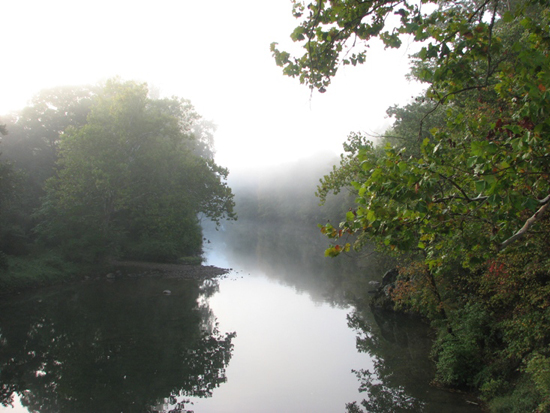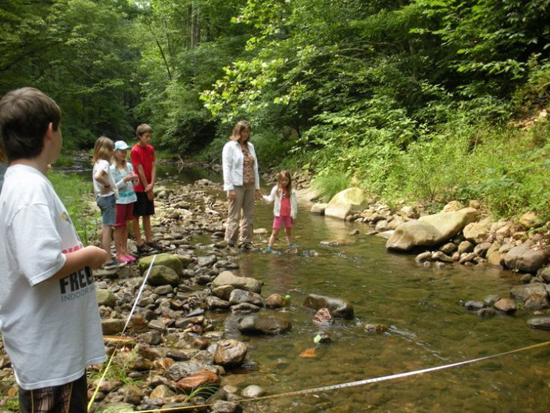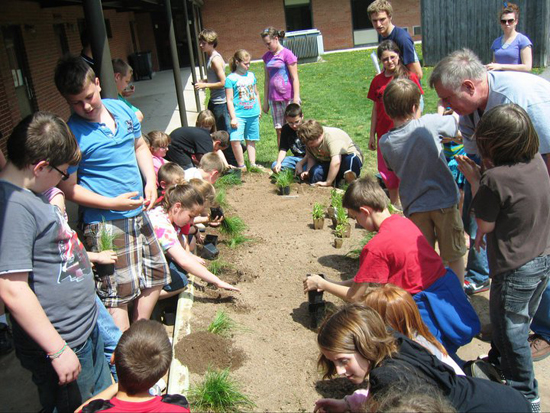Watershed Wednesday: Cacapon Institute (High View, West Virginia)
Folks at the Cacapon Institute in eastern West Virginia are spearheading efforts to help the Potomac River and the Chesapeake Bay.
West Virginia may be far from the sailboats and blue crabs that we normally associate with the Chesapeake Bay. But folks at the Cacapon Institute in the state’s eastern panhandle are helping students install rain gardens, speaking with local farmers about reducing pollution, and spearheading community education initiatives – all in the name of helping the Potomac River and the Chesapeake Bay.

(Image courtesy mdmarkus66/Flickr)
Founded by a husband and wife team in 1985, the Cacapon Institute was originally known as the Pine Cabin Run Ecological Laboratory. PCREL was established to research and teach Appalachian natural history and water quality issues around the Cacapon River, an 80-mile-long Potomac tributary that is designated by the EPA as an American Heritage River.
The Cacapon Institute’s dual mission of scientific research and education makes it stand out from organizations that emphasize one over the other. Today, the Cacapon Institute continues to balance community education and outreach with science “experiments” such as deer fencing and trout restoration.
Be a Stream Cleaner
Ever get sick of all this environmental talk? Do you think you could stop pollution if you were a county land manager or decision maker? The Cacapon Institute gives K-12 students that opportunity through its interactive Stream Cleaner Environmental Forum.
Stream Cleaner allows users to decide how land is used and see the effects of those decisions on natural resources. It’s an interactive, engaging way for students to learn about water and pollution issues.
The program is part of the greater Potomac Highlands Water School, a website that provides resources for teachers and students seeking to learn about their local environment. Slideshows, interactive games and vocabulary lists make it a hybrid of “old school” and digital learning. No matter what generation you belong to, it's worth a visit.
Training the next generation in real-world collaboration
The Cacapon Institute isn’t just teaching students vocabulary words; it’s challenging them to collaborate on water quality projects.

(Image courtesy Cacapon Institute/Facebook)
Each spring, Cacapon sponsors the Stream Cleaner Environmental Forum, a program in which classes work together to develop solutions to specific, real-world pressures on the Potomac and the Bay.
Participating students learn from the best; collaborators range from local farmers and businesses to state and federal agencies. Projects such as Farmers as Producers of Clean Water hinge on input from local farmers about which best management practices they’d most likely adopt. By understanding the needs of different stakeholders and working with them to develop mutually beneficial solutions, Cacapon is creating a community that’s strengthened by cooperation, rather than oppressed by regulation.
Students first
The Cacapon Institute hopes that by starting with the younger generation, it can engage the wider community. This statement on its website says it all:
As educators, we work to create a future where a stream without a buffer looks as out of place as a smoker in a conference room looks today. To foster that vision, our environmental education efforts focus on students first and, through them, the larger community.

(Image courtesy Cacapon Institute/Facebook)
Other highlights from the Cacapon Institute:
- CommuniTree: Cacapon partners with the West Virginia Conservation Agency and West Virginia Potomac Tributary Team on this all-volunteer run forestry initiative.
- An aerial slideshow of the Cacapon River in 1990 and 2005. Notice a difference?
- The “Oh Deer!” Forum allows students to explore social and environmental consequences of deer overpopulation.

Comments
There are no comments.
Thank you!
Your comment has been received. Before it can be published, the comment will be reviewed by our team to ensure it adheres with our rules of engagement.
Back to recent stories